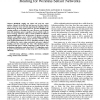125 search results - page 3 / 25 » Reducing Average Power in Wireless Sensor Networks through D... |
IPSN
2004
Springer
13 years 11 months ago
2004
Springer
We propose a distributed on-demand power-management protocol for collecting data in sensor networks. The protocol aims to reduce power consumption while supporting fluctuating dem...
INFOCOM
2006
IEEE
14 years 5 days ago
2006
IEEE
Abstract— Adaptive rate/power control schemes have great potential to increase the throughput of wireless CDMA networks. In this paper, we investigate the additional gains achiev...
ICDCS
2010
IEEE
13 years 10 months ago
2010
IEEE
—As wireless power charging technology emerges, some basic principles in sensor network design are changed accordingly. Existing sensor node deployment and data routing strategie...
ICC
2009
IEEE
14 years 27 days ago
2009
IEEE
—Multipath routing can reduce the need for route updates, balance the traffic load and increase the data transfer rate in a wireless sensor network, improving the utilization of ...
SPAA
2005
ACM
13 years 11 months ago
2005
ACM
Switching cells in parallel is a common approach to build switches with very high external line rate and a large number of ports. A prime example is the parallel packet switch (in...

